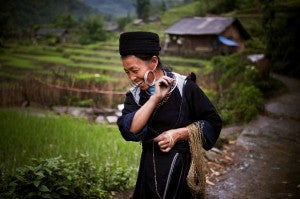Indigenous women working together, raising the volume
Date:

Martha Sanchez was born in an adobe house in Mexico's mountainous Guerrero state, and raised by her grandmother, an indigenous Amuzgo and expert in traditional medicine. As she grew up, absorbing the culture of her ancestors, Martha determined that she would spend her life working to preserve it.
On this path, she met with other women from diverse communities, and together they began to knit a global network. The International Forum of Indigenous Women (FIMI) is now a vast network that spans the Americas, Africa and Asia, promoting the rights of indigenous women in the international arena.
Since 2010, the UN Women's Fund for Gender Equality has worked to help amplify the voices of FIMI members in international decision-making spaces, as part of a programme to strengthen the advocacy networks and governance systems of indigenous women.
Through workshops, UN Women is helping to reinforce the kinds of skills that will allow women leaders' to strengthen their influence at events and forums, from public speaking to negotiation. These workshops have acted as networking hubs, allowing women from across the world to exchange know-how and experiences, and build a common agenda.
The fruits of these trainings can be seen in the greater visibility of FIMI in recent international conferences, such as the Commission on the Status of Women, the Millennium Development Goals Review, and most prominently, at the UN Permanent Forum of Indigenous Issues, which sets common priorities and highlights the concerns and demands of the world's indigenous peoples. Here, members lobbied strongly and with focus to bring the concerns of their members into debates and onto the international agenda.
The training, and its use on the global networking circuit, has also strengthened the role of indigenous women in their communities, as noted by Sanchez. “These alliances have caused women to recognize their capabilities and self-esteem, enhancing their leadership, she says.
Mariana Lopez, a FIMI programme coordinator, admits that generating impact through the Network is not easy, “considering that the mandate is global and covers different realities, languages and geographical areas. Yet despite this heterogeneity, the women have been able to identify and lobby on many common concerns, from the prevalence of violence against women in indigenous communities to the low rates of female political participation.
Advocacy for a ‘prior informed consent' principle or law has also been a strong gathering point for these women. Once able to demand approval for all development or activities that impact indigenous territory, they would be able to, for example, reduce the gender-based violence that often accompanies military development, and regain community control over its health and land rights.
The Fund for Gender Equality works to empower women and girls around the world through subsidies and high impact multi-year grants up to a million dollars, delivered directly to women's organizations and government agencies committed to gender equality.